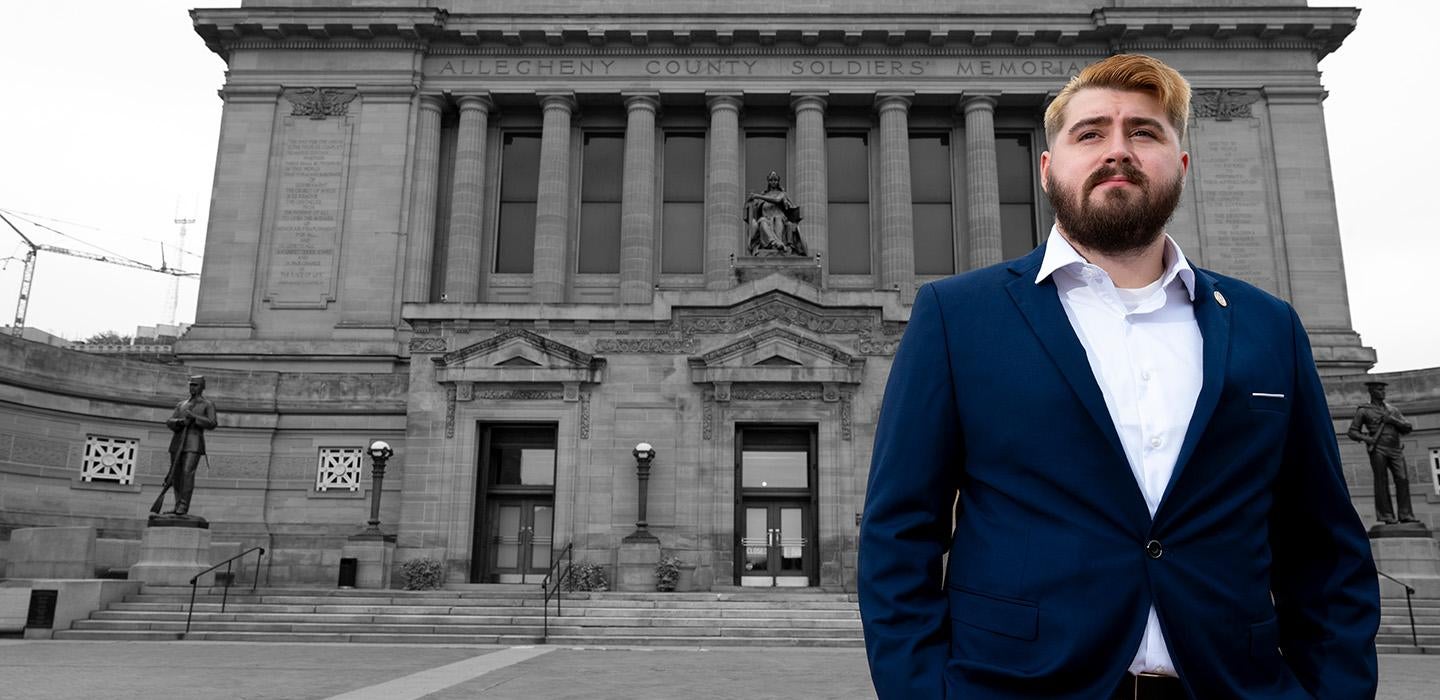
Subscribe to Pittwire Today
Get the most interesting and important stories from the University of Pittsburgh.Skyler Rehbach’s decision to enlist in the military was certain from the time he was in high school. His maternal and paternal grandfathers served in the Marines and Army, respectively, and Rehbach felt following in their footsteps was his only path to higher education.
“My intention was always to go to college, but I don't come from a particularly wealthy family, so it was about looking for options that were accessible. The Army was one of those, you know, with the GI Bill. It was more on the grounds of, if not this, what else?”
The Little Rock, Arkansas, native served in the Army from 2016 to 2021. He spent most of that time stationed with the 25th Infantry Division in Hawaii, an experience he said offered him unique perspectives.
“We’re outside of the traditional United States, working with Pacific nations, developing our skills working with non-U.S. citizens, which was a very rewarding experience, especially going into anthropology,” he said. “You work with people who are different than yourself, come from different backgrounds and places.”
The experience also paved his way to Pitt.
Rehbach, who expects to graduate in 2025, decided to explore his fascination with history and began researching anthropology programs across the country. It wasn’t long before he came across the work of several Pitt anthropologists in the Kenneth P. Dietrich School of Arts and Sciences, which inspired him to apply. Of particular interest was assistant professor and environmental archaeologist Claire Ebert, whose research includes examining humans’ adaptation to environmental change and extreme climate shifts. Ebert also serves as co-director of the Believe Valley Reconnaissance Project, where Rehbach ended up serving as a field researcher before enrolling at the University.
While his life path has granted him more opportunities to see the world, Rehbach said that adapting to civilian and campus life has presented challenges.
“I'm a nontraditional student, so I have days where I seep into impostor syndrome really hard,” he said, citing feeling isolated after starting school at the tail end of COVID quarantines, which was compounded by an expedited medical retirement from the Army on Aug. 1. He had barely a month to secure an apartment before classes began on Aug. 28.
A lot of veterans feel the same way, he said, because many come out of the military years after high school graduation and fall outside the usual age bracket of traditional students.
“That causes some disconnect, because things going on in their lives are not necessarily congruent to the traditional student’s school experience,” said Rehbach. “At times, it gives them a sense of austerity with their peers.”
But that doesn’t have to be the status quo. Pitt Vets, of which Rehbach is president, promotes the success of student veterans, active duty, reserve personnel and military dependents through mentorship, networking, events and advocacy.
As leader of the group, Rehbach wants to increase a sense of belonging for veterans this fall by planning events, such as a September run in partnership with the Steel City Navy ROTC at Carnegie Mellon University and increasing awareness of specific opportunities and offerings from the Office of Veteran Services (OVS). His efforts are already being noticed.
“The Office of Veterans Services is proud to serve our military-related population as they navigate their respective academic journeys, both in and out of the classroom,” said OVS Director John Christman. “Skyler plays an active role in the latter. He mentors new students and provides students with various opportunities to engage in the community and attend conferences. He is a solid academic-minded student and an overall good dude.”
“We are trying to get veterans integrated by pointing them in the direction of resources,” Rehbach said, noting many people are unaware of The Writing Center or scholarship eligibility because they weren’t told. “It’s about providing them information, giving them peers they can talk to and trying to build an overall sense of camaraderie in the same way we had in the military, and allowing for everyone to kind of feel more welcome.”
To continue managing his own sense of belonging, Rehbach is focused on his role as anthropology club secretary, photography, introducing others to new views and his life at Pitt.
“We can help people further integrate into academic and collegiate life.”
Join or learn more about Pitt Vets, and contact OVS to explore their resources and services.
— Kara Henderson, photography by Tom Altany


